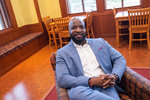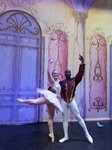Wind: 10.4 mph, W
Welcome to our new web site!
To give our readers a chance to experience all that our new website has to offer, we have made all content freely avaiable, through October 1, 2018.
During this time, print and digital subscribers will not need to log in to view our stories or e-editions.



Look back, look forward, don’t look away.
That will be the topic of NMSU Associate Provost Patrick Turner’s keynote address at the Juneteenth banquet Saturday, June 18, at the Las Cruces Convention Center.
“We have to look back at the people who have come before (and) build on past knowledge,” said Turner, who grew up in a single-parent home in an all-Black neighborhood in Birmingham, Alabama.
It is also important to look to the future, he said, and ask, “Where are we going?” and “How do we get to a better place?”
“What I don’t want you to do is look away,” Turner said. “If you look away, you don’t see my pain, my struggle.”
Americans had become desensitized to violence and police brutality, Turner said, until the May 25, 2020, murder of George Floyd by a Minneapolis police officer. Because the murder happened during the enforced isolation of Covid-19 and was videotaped and seen by millions on television and social media, people could not look away, he said.
“It rattled something in us,” Turner said. People were forced to “sit here and look at this and feel the pain and anger. They couldn’t run away from it.”
The incident raised awareness of violence against Black people, he said, and brought forward many people who are not Black but “want to be allies.”
To be an ally, he said, means finding “the way you can do it best – however it resonates with you.”
That could be anything from becoming involved in policy change to participating in dance art.
In every case, Turner said, it means taking a risk.
“You can’t be an ally from a safe position,” he said. “Allies are on the front row.”
“It’s going to take all of us,” he said, “everybody from any walk of life protesting … from all around the world.”
Turner did not have a white teacher until he attended Kentucky State University (KYSU). He sat in the back of his classes, Turner said, and felt inferior to white students, thinking they would not understand what it was like to grow up in a public housing project in a crime-infested neighborhood.
“However, through music, dance and mentorship, I was voted the first Mr. Kentucky State University, held a leadership role in the Student Government Association (SGA), was elected vice president of the band and served as the drum major during my final year at the university,” Turner said. “Things I could have never imagined for myself.
“That is why I advocate for students finding their voice through whatever talents they possess,” Turner said. “That allows them to be seen, heard and appreciated, in addition to building self-confidence, which will transfer to other aspects of their lives. Visibility is an invaluable experience to a population of people who are often silenced, rendered invisible by society, and not allowed to thrive, but only to survive.”
Turner continued his academic career, earning bachelor’s and master’s degrees and becoming a professor and administrator in Georgia State University’s J. Mack Robinson College of Business. He also earned a Ph.D. in educational leadership.
Because he wanted to “experience what it meant to be ‘the other,’” Turner moved to Helena, Montana in 2015 to become director of support services and the only Black member of the University of Montana-Helena College faculty and staff. The school had approximately four Black students among a total student population of 1,400, Turner said.
“What can they learn from me?” he wondered. “What can I learn from them?”
“it was an experience,” Turner said. “It opened up my eyes.”
Turner became “intentionally invested in the community” in Bozeman, he said, attending rodeos and fairs and going on hunting trips with students and faculty. He also explained repeatedly “why we should have the Black experience” to support all students at Helena-UM, Turner said.
“In order to reach me, you’ve got to learn to see me first,” he said.
After three years at MSU, Turner was mentally exhausted.
“I felt welcome,” he said. “I never felt like I belonged.”
That changed when Turner came to Las Cruces in December 2018, he said.
Within six months, “I felt this connection to this place,” he said.
As associate provost for student success, Turner brought more than 20 years of academic experience to NMSU, along with a passion for dance, music and the arts. He played trumpet in elementary school and high school, attended KSU on a band scholarship, and, at age 18, began secretly taking ballet classes at the YMCA.
“I hid it forever until I got comfortable enough to say, ‘I want to dance,’” Turner said.
He danced for two decades with Ballethnic Dance Co. and Festival Ballet, both in suburban Atlanta. He was also a dance teacher, choreographer and artistic director, and became a personal trainer.
Turner also got the opportunity to perform during the 1996 Olympics in Atlanta, work with actress Debbie Allen and train with Jimmy Locust, the choreographer of Janet Jackson’s Rhythm Nation. He has performed principal roles in more than 100 ballets, including “Swan Lake,” “Nutcracker,” “Peter Pan,” “Alice in Wonderland” and “Le Corsaire.”
Turner’s experience on stage – in fact, his whole lived experience – has helped him to “be comfortable with being uncomfortable,” he said. That’s part of his message to NMSU students, especially freshmen:
“The more I expose myself, eventually it turns out to be something amazing.”
He’s striving to “meet students where they are,” Turner said, and to make NMSU “accountable to our mission to support all of our students.”
“You have to have that rooted connection,” he said.
The Juneteenth banquet is at 6 p.m. Saturday, June 18, at the Las Cruces Convention Center, 680 E. University Ave. Tickets are $50 and are available at https://naacpdac.org/asp-products/juneteenth-2022-banquet/.